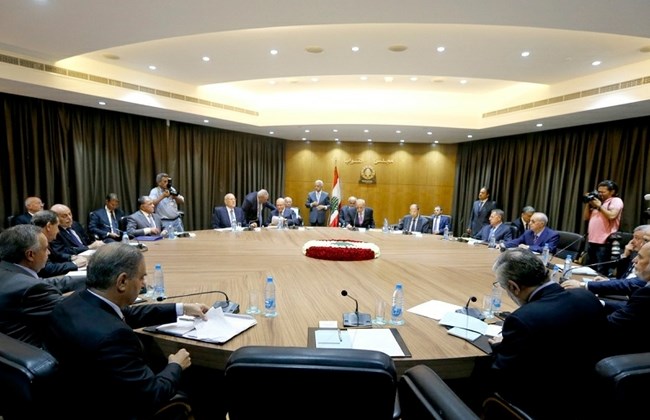Lebanon’s political elite Tuesday failed to make any tangible progress on the presidential crisis during the third round of dialogue talks at Parliament, as protesters gathered in nearby Martyrs’ Square.
 Lebanon’s political elite Tuesday failed to make any tangible progress on the presidential crisis during the third round of dialogue talks at Parliament, as protesters gathered in nearby Martyrs’ Square to challenge them to a football match using balls with their demands written on them.
Lebanon’s political elite Tuesday failed to make any tangible progress on the presidential crisis during the third round of dialogue talks at Parliament, as protesters gathered in nearby Martyrs’ Square to challenge them to a football match using balls with their demands written on them.
A statement issued by the Parliament’s general secretariat said the rivals will hold consecutive sessions on Oct. 6, 7 and 8, which will focus on the election of a new head of state.
After the session ended, Speaker Nabih Berri met in a closed-door meeting with Prime Minister Tammam Salam, the head of the Future bloc Fouad Saniora, Change and Reform Bloc chief Michel Aoun, head of Hezbollah’s Loyalty to the Resistence Bloc Mohammad Raad, Progressive Socialist Party leader Walid Jumblat, and their advisers.
“We are still discussing the first item on the agenda,” Telecommunications Minister Boutros Harb, who is affiliated to the March 14 coalition, told reporters as he was leaving the general assembly, referring to the presidential void.
Marada Movement leader MP Suleiman Franjieh told reporters that the meeting was “more than positive.”
For his part, Progressive Socialist Party leader MP Walid Jumblat said “the debate is continuous and serious,” declining to reveal more details.
Meanwhile, Change and Reform bloc leader MP Michel Aoun “gave up his demand on electing a president by a popular vote and spoke of a proportional representation (electoral) law based on 15 electorates,” LBCI television said.
Media reports said the post-session meeting tackled the controversial issue of the promotion of army officers.
Security forces deployed in the vicinity of the Parliament and again employed extraordinary measures despite the absence of any planned street protests.
On Sunday, hundreds of protesters pushed through a security cordon as they marched toward parliament. It was the latest in a series of demonstrations that began with a trash crisis following the closure of the Naameh landfill in south Lebanon but has since expanded to target the country's political class.
The presidential deadlock tops the agenda of the all-party talks, which are expected to tackle the resumption of the work of parliament and the cabinet, a new electoral draft-law, legislation allowing Lebanese expats to obtain the nationality, administrative decentralization and ways to support the army and the Internal Security Forces.